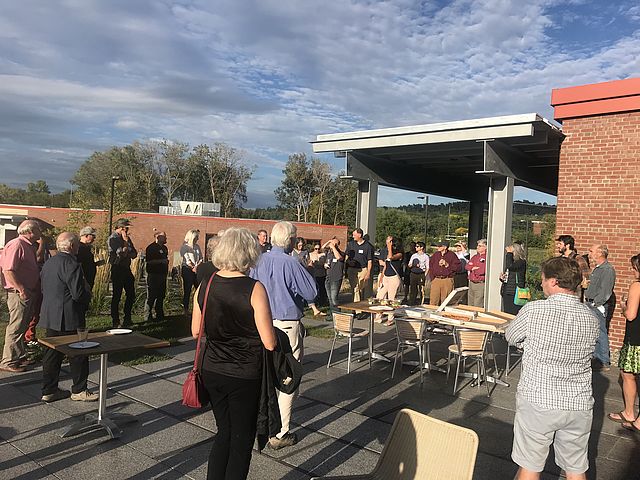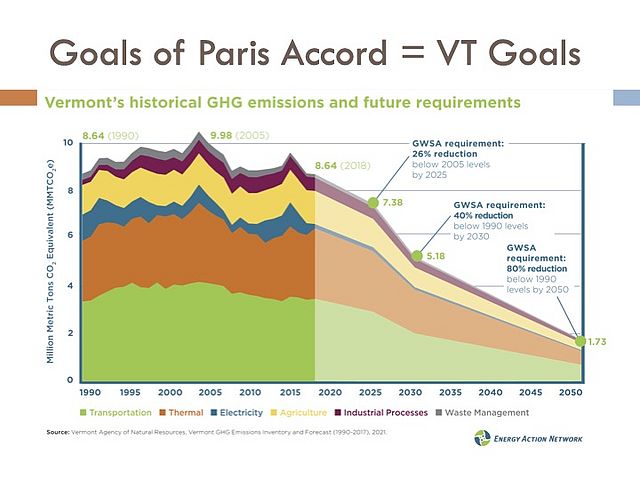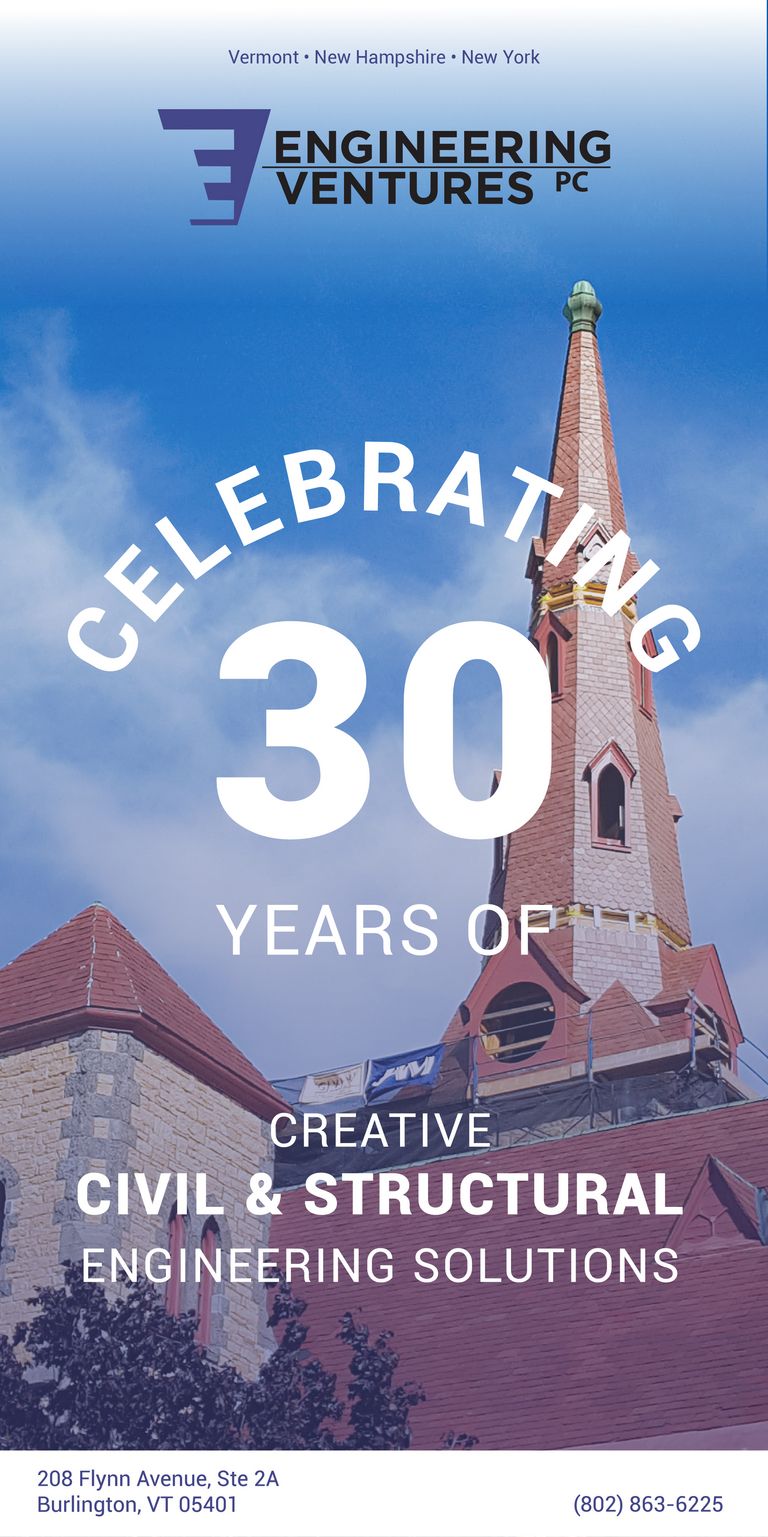AIAVT's Public Policy Committee hosts Tour & Presentations at HULA
On September 22nd the AIAVT Public Policy Committee (PPC) held an event at HULA for 42 attendees. The event consisted of a HULA happy hour, a tour of the recently completed HULA co-working space, and a PPC led Pechakucha style presentation on 6 Legislative priority areas that the Public Policy Committee is tracking on behalf of our chapter members. The event sponsors and tour leaders were the HULA construction managers, HP Cummings, and the project designers, SAS Architects. Special thanks goes to PPC Co-Chair, Jesse Beck, for helping to organize the event.
The Pechakucha presentation on the 6 legislative areas addressed the following:
Contractor Registration presented by Eric Morrow
Rewritten from last year, this bill (H. 157) was developed in response to the Attorney General’s office receiving over 600 complaints from VT homeowners totaling over $1 million in the last 8 years. This bill proposes the creation of a contractor registry, which does not currently exist, to help protect consumers. Additional provisions will allow for certification to identify special expertise or training. AIAVT supports this bill, which made it through the House and Senate, but narrowly missed being passed due to the session running out of time before an amendment could be voted on by the House. Please see AIAVT’s position statement on this bill here. PPC will reach out to members to ask them to contact their representatives and ask that they support H. 157 to help get it passed this session.
Climate Action Plan presented by Donna Leban
The VT Climate Council was tasked by the VT legislature to make recommendations to enable the state to meet greenhouse gas (GHG) emission reduction goals established in the Paris Climate Accord. By 2025, these goals require a 25% reduction below 2005 levels when VT GHG peaked, and 40% reduction by 2030. Building-related fossil fuel use in Vermont is 34% of the total, with only transportation higher at 40%. AIAVT has provided building-related policy priorities to the VT Climate Council to help set state priorities. Since existing buildings make up the greatest share of fossil fuel use in buildings, architects have an important role when buildings are being renovated, although reducing or eliminating fossil fuel use in tens of thousands of existing homes and businesses will be necessary to meet goals.
Uniform Codes and Enforcement, presented by Tom Bursey
Vermont’s adopted building codes, rules, and regulations are very complex, cumbersome, and at times municipal codes exceed those within adopted state codes. We would like to see Vermont consolidate and simplify these codes.
We recommend Vermont place the Vermont Energy Standards under DFS jurisdiction similar to the Vermont Access rules (ADA) and have basic energy standards as part of the review process. We envision this to be a properly funded, oversight body that can clarify questions and is responsible to assure uniform enforcement. Ideally becoming a one-stop review for Building Public Safety, Energy Standards, and Access for people with disabilities.
We support a goal of achieving the federal minimum of 90% compliance with Vermont energy standards for building construction and 100% compliance with certificate filing/posting as soon as possible. We believe this is best done through education, clarity (access to code clarifications), and enforcement. The Vermont Energy Standards should recognize the Climate Action Plan, and strive to align with its goals.
Clarity on ACT 250 Criterion 9(F) around the requirement for “incorporating the best available technology for efficient use or recovery of energy.” While we support that goal, in our opinion, the particularities of documentation are misplaced in the design process timeline (details of energy compliance are often better figured out during CDs phase and not permit review phase).
We support the job the DFS has done and continues to do, and look to further the opportunity for greater connection between our two organizations. AIA-VT's policy is generally to support simplification of building codes and standards, adoption, compliance and review process, thus making it more user friendly, transparent, and uniformly applied and enforced.
Statute of Repose, presented by Bob Duncan
An AIAVT membership poll indicated that getting legislation to enact a Statute of Repose for professional services is a very high priority. As most members know, several attempts have been made in the legislature, the most recent dying in its second committee vote in the Senate. Getting such legislation all the way to enactment is a long process, requiring significant effort, starting with getting at least one representative and one senator to introduce the legislation, following it closely through the committee process, actively supporting it (in both the house and senate) when it comes to a vote, and ultimately encouraging the governor to sign it. And the most important first step means letters and phone calls from an overwhelming majority of our members (as well as engineers) to legislators. Our last attempt, which enjoyed support in the legislature from some key members, was doomed for two fundamental reasons: opposition from the trial lawyers’ lobby, and paltry support from our own members. If those of us most affected by the lack of such legislation do not actively participate in the process through letters, calls, attendance at committee hearings, etc., any new effort will not likely succeed; in fact, a groundswell of member support is critical for the PPC to try yet again.
Professional Licensing Required for Projects, presented by John Alden
AIAVT and DFS have been discussing the State’s permit application requirement calling for plans stamped/signed by a licensed design professional for several years. State statute appears to require this, while DFS maintains that they have the ability to waive this requirement. Pressure from the Governor's office to speed up turnaround time on permit approvals and a large percentage of very small project applications led DFS to informally and then formally allow projects under $200,000 and meeting certain requirements to be submitted without stamped plans. AIAVT members have reported some loss of work due to this policy, and the PPC continues to call for adherence to State statutes. Discussions with DFS are ongoing and productive for other reasons. They have indicated they are considering lowering the dollar threshold to $100,000, but we have not seen any movement yet. There is always room at the table for other interested AIA members to attend the DFS meetings. Contact Sarah or me if you are interested.
Affordable Housing, presented by Nathalia Ellis
This past year AIAVT has been discussing affordable housing and investigating ways that we can support our community. Vermont currently has a housing crisis that is affecting many, and we as a chapter would like to be part of the solution and also provide support for organizations that are already doing the work. During our PPC event, we discussed the steps we are taking to help address the issue and some of the many factors that are increasing the cost of housing in Vermont. We have had three coffee calls this year to discuss this issue, and we are looking into expanding our investigation through a panel discussion and possibly a design charrette in 2022. Please send us a message if you have any thoughts on how architects can help with this issue and if you would like to be part of this effort!
The PPC committee is assessing goals and objectives for the 2022 Legislative session. The AIAVT PPC is made up of members who are passionate about the topics and issues that impact the architectural profession, as well as Vermont’s communities. If any member would like to join our committee, help shape our agenda, or focus on a specific item please contact Sarah O Donnell. The AIAVT Board is looking to form a committee to address the issues around hiring a Lobbyist to assist our members in achieving legislative change and addressing issues by others that would affect our profession. Please contact Matt Bushy or Sarah if interested in joining that initiative.








